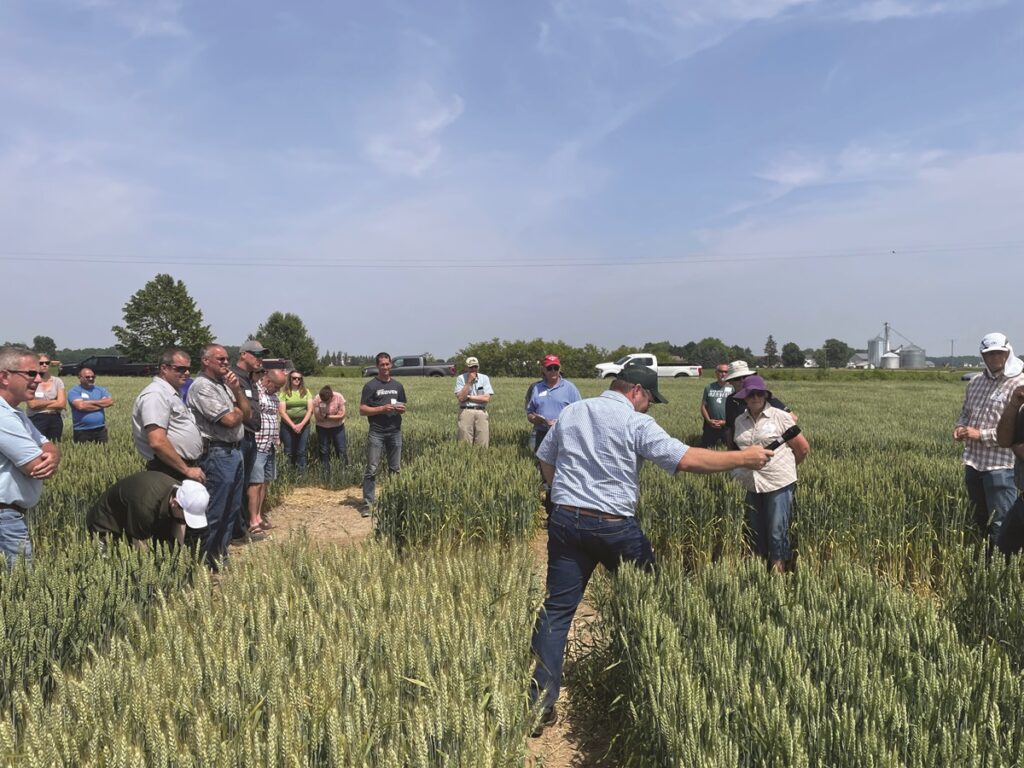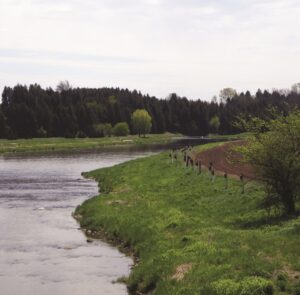2024 YEN wrap-up
A SUCCESSFUL THIRD YEAR IN THE BOOKS

THE ONTARIO GREAT LAKES YIELD ENHANCEMENT NETWORK
(YEN) wrap-up meeting, held in January 2024, kicked off with a welcome from Marty Vermey, senior agronomist with Grain Farmers of Ontario and a welcome video from Dr. Roger Sylvester-Bradley, head of crop performance with ADAS — the founders of the Yield Enhancement Network in the U.K. Sylvester-Bradley congratulated the group for the tremendous interest in the program in North America and also took the time to present some data summarizing the factors that affect yields in the U.K., emphasizing that there are several factors both in and out of farmers’ control.
One of the most anticipated sessions of the day was the 2023 Great Lakes YEN data recap presented by Joanna Follings, Ontario Ministry of Agriculture, Food and Rural Affairs (OMAFRA) cereals specialist, and Dennis Pennington, Michigan State University wheat systems specialist. They noted that a few trends were evident across fields that participated in 2023: most fields used no-till practices, seeded wheat after soybeans, and applied a fungicide at both the T1 (early spring) and T3 (flowering) stages for disease management. It was hypothesized that some of the high yields achieved in 2023 were due to a longer and cooler grain fill period. Higher solar radiation (both incident and intercepted) across the region was also highlighted compared to previous years.
A correlation analysis was also presented, highlighting the relationships between different variables. With thousands of correlations assessed in 2023, a few key relationships were identified. The team noted that the amount of above-ground biomass from the mature winter wheat crop was strongly tied to higher grain yields, evident in the high biomass recorded for the 2023 yield winners in Ontario and the U.S. Higher biomass helps with earlier canopy closure and more solar radiation capture. Other factors associated with high yields included the number of heads per square meter and the number of grains per square meter.
FACTORS AFFECTING YIELD STABILITY
Dr. Bruno Basso, from Michigan State University, presented the factors affecting yield stability to the group over all three years of the Great Lakes YEN program. Dr. Basso explained the concept of a “digital twin,” which recreates an entire field digitally with the help of artificial intelligence, remote sensing, yield history maps, and SALUS (systems approach for land use sustainability). This approach allows Dr. Basso’s lab to create detailed temporal yield stability maps, showing stable versus unstable areas of a single field. With increasing interest in the agricultural research community to create a spatial inventory of yield maps, Dr. Basso and his team were able to take the data collected by Great Lakes YEN participants and create individual yield stability maps. Farmers can then use these maps to help them determine how to best manage specific areas within their fields, particularly those underperforming. Eventually,
Dr. Basso hopes that the benchmarked data collected through the YEN and the process-based models his team is working on will be used to develop strategic and tactical management decisions that could someday help farmers calculate their sustainability metrics, such as a carbon footprint.
PANEL DISCUSSION
Jeff Cook, who farms near London, Ontario, was joined by Jeffery Krohn from Elkton, Michigan, and Jonathan Zettler, Certified Crop Advisor and owner of Fieldwalker Agricultural Services, for a grower panel session. All three have participated in the Great Lakes YEN program since it began in 2021 and have made small changes to their cropping practices every year based on the data in their final reports. For example, Cook has updated his planting equipment and has started using the results of his soil and tissue tests to adjust his inputs; and Krohn now prioritizes preserving the health of his soils, carefully keeping track of how the plant uses nutrients throughout the growing season which is now possible by comparing the results of the nutrient results he receives after taking his soil, tissue, plant, and grain samples as part of the YEN program.
Zettler shared that with the multiple fields he provides agronomic advice on, the most important consideration for farmers is how their drill performs in high residue environments. He also emphasized the importance of recording tillers per plant in the fall (as this influences the number of heads per plant) and noted how he has seen growers who have taken part in the YEN program over multiple years make small changes to their crop management every year to improve the yield potential they can achieve continually. Jonathan reiterated the importance of high biomass — all his top growers in the 2023 YEN program had higher-than-average biomass.
THE 2024 YEN
2024 GREAT LAKES YEN WINNERS
The winners of the Great Lakes YEN competition for the highest yield potential include:
- Mark Davis (Napanee, Ontario) – 117.6 per cent
- Jeffery Krohn (Elkton, Michigan) – 107.2 per cent
- Wallace Loewen (Middleton, Michigan) – 107.2 per cent
The winners of the highest yield are:
- Jeff Cook (London, Ontario) – 173.4 bushels/acre
- Nick Suwyn (Wayland, Michigan) – 171.43 bushels/acre
- Jeffery Krohn (Elkton, Michigan) – 167.1 bushels/acre
The YEN program prioritizes grower-to-grower networking and on-farm learning. Throughout the day, attendees had plenty of time to ask detailed questions about best management practices, recommendations for the year ahead, and what updates will be made as part of the 2024 Great Lakes YEN program. Farmers were able to learn about what practices other winter wheat growers and agronomists plan to implement in 2024, whether it be the timing of crop inputs or adjusting their row width in future years.
A special thank you to all the farmers and agronomists who worked together to make the 2023 season a tremendous success. Thank you also to the sponsors who support this innovative program, without which the Great Lakes YEN could not exist in its current form. The 2024 Great Lakes YEN program is currently underway, with more than 200 fields involved across the Great Lakes region of Ontario and the United States.
Alexandra Dacey is Grain Farmers of Ontario’s agronomy project coordinator. •




















